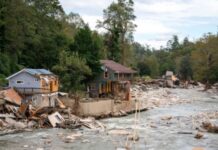
Hurricane Helene has brought chaos and destruction to Georgia and North Carolina, two key swing states in this election year, but it’s the hard-hit rural counties — many of which lean pro-Trump — that have sparked a surprising conversation. While these communities continue to struggle with the hurricane’s aftermath, a recent comment by former Obama adviser David Axelrod stirred controversy. Axelrod suggested that while liberal voters in areas like Asheville, North Carolina — known for its progressive and affluent population — will find a way to navigate the voting process, rural Trump supporters might face greater difficulties in getting to the polls.
Asheville, a so-called “blue dot” in North Carolina, was among the many areas ravaged by the storm, but Axelrod’s comments focused on the demographic differences between liberal voters there and conservative voters in the more rural, predominantly pro-Trump areas also hit by the storm. He noted on his podcast, “Hacks on Tap,” that the voters in Asheville, who tend to be “upscale” and “liberal,” are likely to “figure out a way to vote” despite the damage. In contrast, Axelrod hypothesized that the rural, Trump-supporting voters, many of whom have lost their homes and livelihoods, may face more challenges in casting their ballots.
On his podcast @davidaxelrod says Democrat voters in Asheville, North Carolina are smarter, wealthier and will still show up to vote for Kamala while he thinks Trump voters won’t. This is why Kamala and Biden aren’t helping, they benefit from the disaster: pic.twitter.com/CqCAY0An74
— Clay Travis (@ClayTravis) October 4, 2024
These remarks, of course, sparked debate. The implication that liberal voters are more capable of overcoming the storm’s aftermath while Trump voters would struggle has been criticized as both condescending and divisive. Axelrod’s prediction has also raised concerns about how election outcomes could be shaped by the hurricane’s impact, particularly in regions where infrastructure has been severely damaged.
As if to underscore these challenges, the situation in Bat Cave, North Carolina, serves as a striking example of government failures in the storm’s wake. Chelsea Atkins, a resident of the town, described how FEMA’s refusal to drive past a “Road Closed” sign left her and others to fend for themselves in the critical days following the disaster. The storm not only washed away homes and roads, but it also revealed the gaps in government response, leaving people like Atkins feeling abandoned by the very agencies meant to offer relief.
The political ramifications of this disaster are still unfolding. With the storm hitting both Democratic and Republican strongholds, the race for North Carolina — already a pivotal battleground state — has grown even more unpredictable. Will the logistical challenges posed by the hurricane disproportionately affect rural Trump voters, as Axelrod suggested, or will it inspire an even greater turnout as these communities rally to rebuild and recover? One thing is certain: in the midst of the physical and political wreckage left by Hurricane Helene, the resilience of these communities will be tested — both in the voting booths and in their long path to recovery.






















